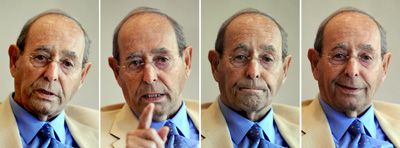
(RNS1-JUN5) Rich DeVos spoke of getting the long-separate Christian Reformed Church and Reformed Church in America back together during in an interview at Amway World Headquarters in Ada, Mich. For use with RNS-DEVOS-QANDA, transmitted June 5, 2009. Religion News Service photo by Hoyt E. Carrier II /The Grand Rapids Press.
ADA TOWNSHIP, Mich. — Amway co-founder Rich DeVos’ legs may be weak, but his mind and heart are going strong.
Even at 83, as the $8.2 billion company he co-founded with the late Jay Van Andel marks its 50th anniversary, the philanthropist billionaire still thinks big.
During a recent wide-ranging interview, DeVos said his next project is to bring the long-separate Christian Reformed Church and Reformed Church in America back together.
Calling the 1857 secession one of the things that has “bugged me all my life,” DeVos said he hopes to undo the Reformed Church split that has divided families (including his grandparents) and weakened each church’s ability to be a “witness for Christ.”
This interview has been edited for length and clarity.
Q: Is there anything else you want to do before you’re gone?
A: Right now I’m working on trying to reform the Christian Reformed Church, put them back to one.
I’m working through the seminaries and I’m working some through the churches, so that we get to the proper bodies to try to move on it. I think that they’ve been separate for too long, and not with any good reasons anymore. Sometimes, it’s time to rise above the pettiness of those things and move on.
Q: How soon do you think you can make that happen?
A: I have no timeline on it. I’m just planning it and saying it’s time to get on with it, guys.
It’s not maybe unlike what goes on in Detroit. There are too many little things that get in the way of people moving on to support each other and help and have a stronger message.
If the auto plants in Detroit would just sit around the table and say, “What do we gotta do to make this thing work?” Instead of, “I want this and I want that.”‘ They might make it.
If these two church denominations can find out what little differences they have, which the average person in these churches doesn’t even know about, maybe we can get it done. I think it’ll be a stronger witness for Christ.
Q: Sounds like you’re putting some of your personal influence in it. I imagine you’re putting some personal resources in it as well?
A: I’ve talked to a few people and I’m hiring somebody to start to work on it. It’s just a little cause. You asked me what I wanted to do yet. That’s one little thing I’d like to do yet.
Q: You gave $100,000 to the effort to defeat the recognition of gay marriage in Florida. Why did you choose to put money behind that cause?
A: Because I believe in it. That’s just a sacred issue of respecting marriage. It was not an anti-gay thing.
I have been hung in effigy by the gay community for a long time, from when I was on President Reagan’s first AIDS commission.
Q: How does that tie in with the gay marriage issue?
A: From that point on, that’s when they were hanging me in effigy because I wasn’t sympathetic to all of their requests for special treatment. Because at that time it was always somebody else’s fault. And I said, “You are responsible for your actions, too, you know. Conduct yourself properly,” which is a pretty solid Christian principle. You’ve got to take responsibility for your actions. It went from there to a series of requests for special treatment.
Q: Is there a compromise you would support?
A: Call it something else. Call it anything you want to. But marriage is a sacred document, OK? A sacred sacrament in the church and in the world. Don’t mess with it.
Q: You have had 12 extra years you would not have if not for a woman in England who was able to give her heart when she received a heart-lung transplant.
A: She passed away recently, last year. So her heart goes on. And she’s passed on. Isn’t that something?
Q: How do you respond to people who think: “Well, here’s a billionaire and he went over to England and bought a heart.” The average person who is in his 70s would not be able to afford to do that and may not have been able to have that same opportunity.
A: I guess my quick reaction, my cute reaction, is: “That’s the benefit of making money, isn’t it? That’s the benefit of being industrious.”
I look at that as the hand of God. What happened in my case, there’s no other explanation for it. There are too many little things that occurred.
Q: How do you think President Obama is doing?
A: I don’t like a lot of what he’s doing. He’s a little scary to me. He’s terrific. I watched his Notre Dame speech yesterday, and I’ll tell you, he’s good. He can take a controversial issue and handle it very well and you know, there’s a lot of merits to what he’s talking about. You can’t compromise the sacredness of the unborn child either from our belief that God created them, too. That’s a sacred issue. Just like the marriage issue. Those are sacred things now; we’ve got to respect that.
(Chris Knape writes for the Grand Rapids Press.)




